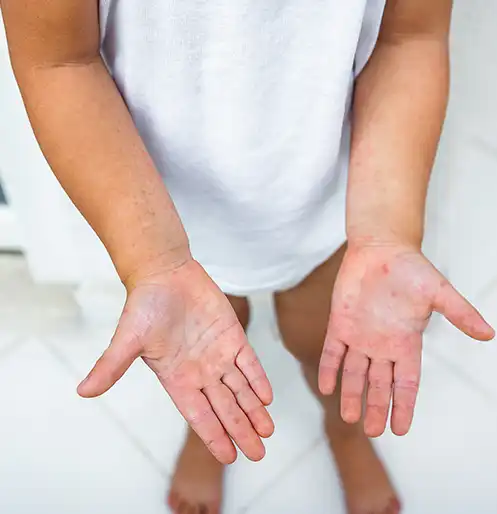What is Psoriasis?
Psoriasis is a recurrent, inflammatory, and scaly skin condition that can arise at any age. It is caused by both hereditary and external factors. Many patients have a limited number of persistent red scaly patches, although the condition can occasionally be more widespread or severe, such as pustular psoriasis or erythrodermic psoriasis. Moderate to severe psoriasis can be fatal since it has been associated with an elevated risk of cardiovascular disease and metabolic syndrome.
Psoriasis, readily apparent on exposed skin, can have a major impact on quality of life, including self-esteem, social relationships, and job prospects. Arthritis affects roughly 10% of psoriasis patients and can be a serious disease in some individuals.
This skin condition requires immediate medical attention and at DermoRita Skin Clinic, the best dermatologist in Delhi, Dr. Sarita Sanke provides psoriasis treatment and helps one to achieve healthy disease-free skin.
Types of Psoriasis
Psoriasis is classified into numerous forms, each with its own set of symptoms. Patients may be diagnosed with multiple types at the same time.
- Plaque psoriasis: An overactive immune system causes the deposition of dead skin cells as flaky, red, or white scaly areas on the skin.
- Guttate psoriasis: Guttate psoriasis appears with small red spots that are spherical in appearance.
- Inverse psoriasis: Inverse psoriasis is caused by the accumulation of red lesions in skin folds.
- Pustular psoriasis: Pustular psoriasis is characterised by the appearance of white pustules or blisters surrounded by red skin. These blisters frequently exude fluids.
- Erythrodermic psoriasis: Erythrodermic psoriasis is an uncommon type that causes significant skin redness, shedding, intense itching, and pain.
Dr. Sarita Sanke, the Psoriasis treatment doctor in Delhi, provides treatment for all types of psoriasis. She first checks the patient's skin and diagnoses the root cause of the disease. Based on the findings, a treatment plan is advised to the patient. One can consult her at DermoRita Skin Clinic for more details.
What Causes Psoriasis?
Genetic factors undoubtedly have a role, particularly in people who develop psoriasis at a young age. A number of genes are believed to be involved, and the manner of inheritance is unknown but likely to be complex. However, environmental factors are widely reported to play a role. Psoriasis appears to affect only one of the identical twins, emphasising the importance of environmental factors in its development.
The following factors have been linked to the earliest stages of psoriasis in predisposed individuals:
- Medications: Medications include lithi-um, beta-blockers, antimalarials, and NSAIDs (nonsteroidal anti-inflammatory medications).
- Infection: Streptococcal throat infection and tonsillitis, as well as HIV
- Serious psychological stress
- Physical harm or surgery.
Psoriasis Symptoms
Psoriasis symptoms include:
- Raised, inflammatory patches of red and salmon-pink skin
- Silvery-white scales or patches on the skin
- Dry, damaged skin that may bleed
- Itching, burning, or discomfort
- Thickened, deformed, or cracked nails
- Swollen and painful joints.
Psoriasis Treatment in Greater Kailash
Although there are several treatment options for psoriasis, there is no cure (but symptoms can be managed). The severity of the condition determines the type and strength of treatment. Topical therapy in the form of creams and ointments is used for mild disease, whereas tablets may be required for severe psoriasis.
- Topical therapy: Topical therapy involves applying lotions and creams to the affected skin area. Some of these are available without a prescription over the counter. A corticosteroid is commonly found in the most effective creams. The steroid in the cream suppresses the immune system and the inflammatory reaction that occurs in the area where the psoriasis lesions are found. It is best to consult with the doctor about the best cream for the affected area. Other lotions and ointments available include vitamin D creams, coal-tar-based creams and shampoos, and vitamin A treatment. The beneficial effects of these medications differ.
- Phototherapy: Phototherapy, or light therapy, has been shown to be an effective therapeutic option for psoriasis, especially when conventional treatments, such as topical drugs, have not offered satisfactory relief. Phototherapy uses ultraviolet (UV) light to reduce inflammation, inhibit the rapid proliferation of skin cells, and relieve psoriasis symptoms, including itch. There are different types of phototherapy used to treat psoriasis:
- Narrowband UVB (NB-UVB): A well-known type of phototherapy for psoriasis, NB-UVB provides a specific wavelength of UVB light that effectively heals psoriasis symptoms while reducing the risk of sunburn.
- Broadband UVB (BB-UVB): A less often used type of phototherapy that uses a broader spectrum of UVB wavelengths, BB-UVB may be less effective and involve a higher risk of side effects than NB-UVB.
- PUVA (Psoralen plus UVA): This treatment combines a photosensitizing medication called psoralen, which is taken orally or topically, with UVA light exposure. PUVA is rarely used nowadays and is usually reserved for more severe cases of psoriasis or when other treatment options have failed.
- Systemic drug therapy: This type of Psoriasis Treatment in Greater Kailash, South Delhi is often provided to those with severe psoriasis. The treatment uses a class of medications known as biological agents. These drugs target very specific areas of the immune system that are involved in the onset of psoriasis. They are exceedingly expensive, and the government will only finance them if the patient has not responded to traditional therapies. While using any of the following medications, regular check-ups are essential to monitor for side effects.
Consult Dr. Sarita Sanke, a skin doctor in Delhi to get these treatment benefits at DermoRita Skin Clinic
How to Manage Psoriasis?
Taking care of the skin and overall health will help an individual manage their psoriasis. Here are some general lifestyle changes that may be beneficial:
- Keep the skin well-moisturised: Apply a fragrance-free moisturiser on a regular basis, especially after bathing, to seal in moisture and protect the skin.
- Avoid triggers: Identify and avoid common psoriasis triggers such as stress, infections, skin injuries, and certain drugs.
- Maintain a nutritious diet: Eating a well-balanced diet rich in fruits, vegetables, and whole grains will help support the skin and immune system.
- Manage stress: Stress can aggravate psoriasis symptoms, so practice stress-reduction techniques.
- Limit alcohol consumption: As excessive alcohol consumption might aggravate psoriasis symptoms, it's critical to drink responsibly.

FAQs About Psoriasis Treatment in Greater Kailash
1. How is psoriasis diagnosed?
When the condition proceeds to the formation of silvery scales, a medical examination of the nails and skin can usually be used to diagnose psoriasis. A skin biopsy (taking a small skin specimen to examine under a microscope) can be used to confirm a diagnosis.
2. Are there any factors that cause psoriasis flare-ups?
Yes, there are. These can vary from person to person but could involve the consumption of alcoholic beverages, stress, skin injuries, smoking, cold temperatures, and other autoimmune conditions.
3. Is there any way to prevent psoriasis?
There is no proven way to prevent psoriasis. Although it is an ongoing medical condition, it can be manageable with appropriate therapy. Keeping the skin clean and moist, as well as avoiding person-specific psoriasis triggers (such as excessive stress), may help to reduce flare-ups.
4. What skin care advice can doctors give psoriasis patients?
In the treatment of psoriasis, at-home management is critical. Psoriatic skin is more susceptible to infection than healthy skin and should be treated with caution.
- Use a mild, soap-free cleanser.
- Keep your skin moisturised on a regular basis.
- Avoid skin irritation.
- Picking at psoriasis or the scale can aggravate the condition.
Psoriasis can cause discomfort to the affected individuals and can affect people at any age. It is also important to consult the doctor to get it diagnosed and can get it treated effectively. To get more details on psoriasis treatment cost in Greater Kailash, Delhi, book an appointment with Dr. Sarita Sanke, a top dermatologist at DermoRita Skin Clinic.

